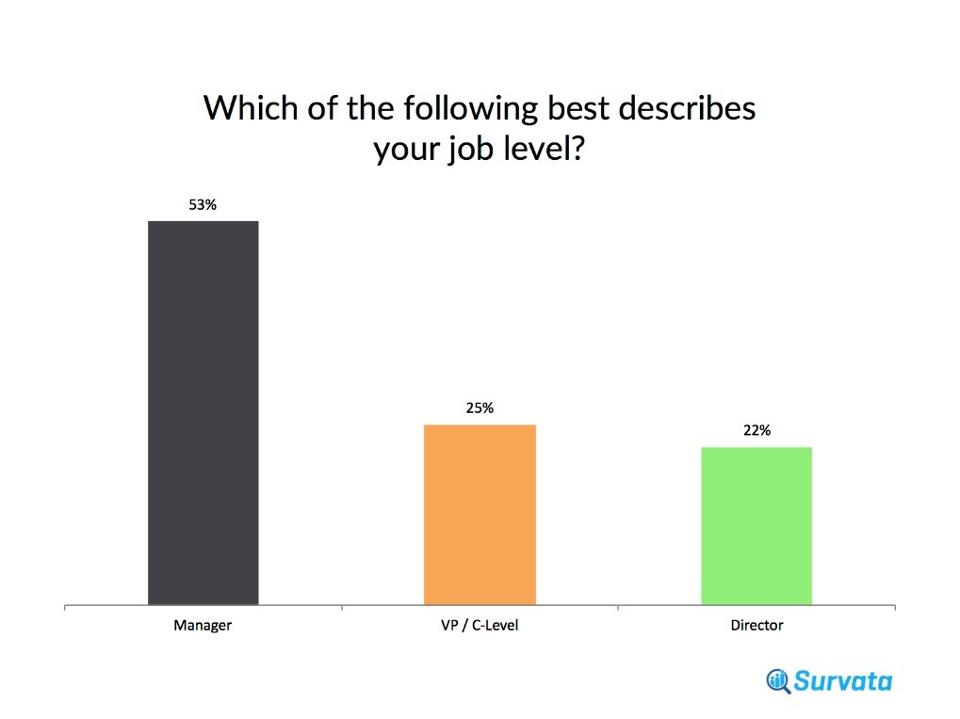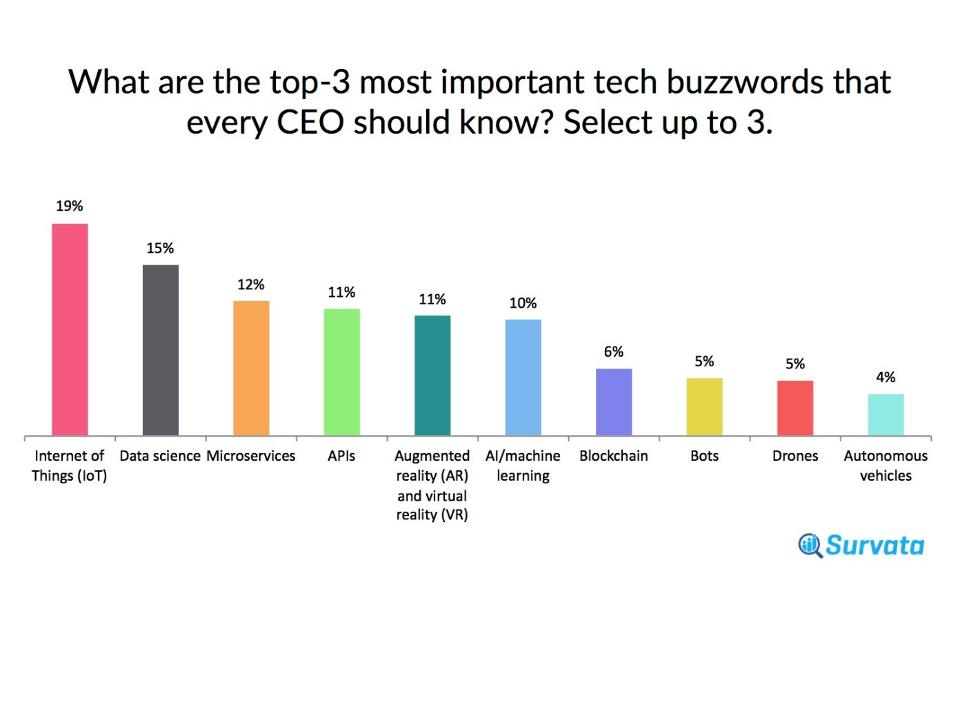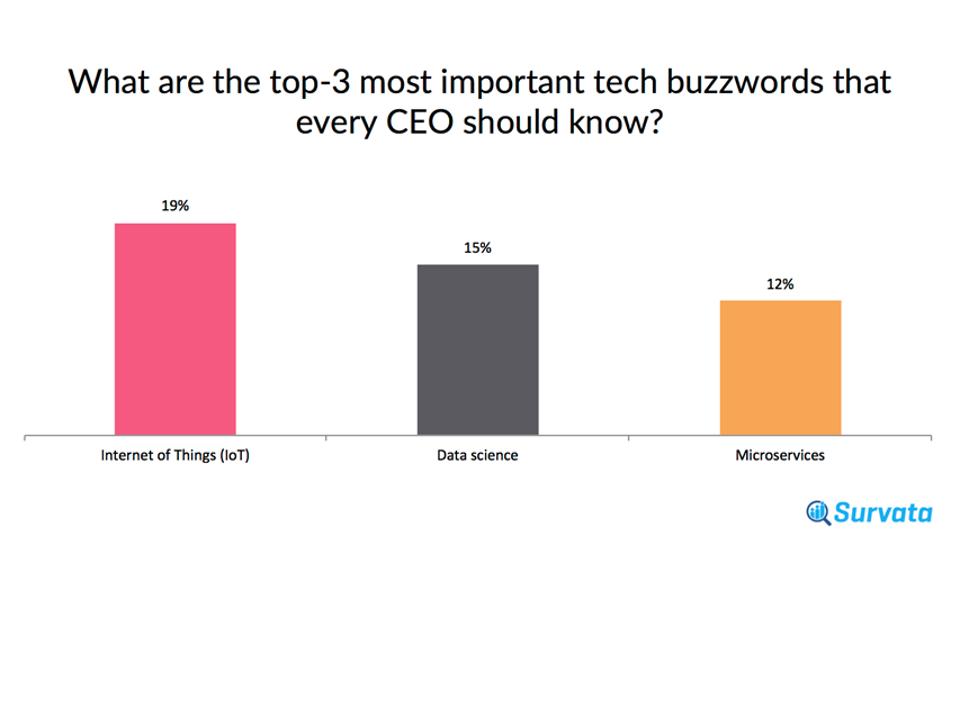This robot at the Institute for Artificial Intelligence can make popcorn. But is AI a topic that CEOs need to worry about today? (Credit: INGO WAGNER/AFP/Getty Images)
If you’re a CEO and sometimes think your technical team speaks a different language, you’re not alone. My world is saturated with tech jargon because I am a venture capitalist who reviews and meets with hundreds of tech startups every month. But which buzzwords are the most important for a CEO to understand? Which tech terms have gained prominence because they point to significant trends that, if not harnessed, can leave a business eclipsed? Look no further than the taxi industry and how it was outmaneuvered by the tech-savvy Uber for a prime example.
If I could only pick 3 buzzwords for every CEO to know, they would be: APIs, Artificial Intelligence (AI)/machine learning, and Internet of Things (IoT). Before I define these buzzwords in layman’s terms and explain why a CEO should care, let me tell you how I added a twist to this exercise.
I wanted to compare my opinion with a group of business people so I commissioned a one-day survey through Survata. Nearly 300 people participated in the survey with the following roles: C-level and VP exec (25%), director (22%) and manager (53%). Approximately 35% were female, 65% were male. The majority (42%) were aged 25 to 34 years-old; with the next biggest group (20%) aged 35-44 years-old.

Credit: Canvas Ventures via Survata
The types of people surveyed for Little’s poll.
Respondents hailed from a nice cross-section of all the regions in the US, as well as, industries from telecom/technology, finance, healthcare, construction, manufacturing, retail, logistics, entertainment, transportation, education, energy, government and more. Below are the top-10 industries represented. The survey asked respondents to select the top-3 most important buzzwords for CEOs from a menu of 10 buzzwords that I had come up with, including: AI/machine learning, data science, APIs, microservices, blockchain, Internet of things, bots, AR/VR, drones, and autonomous vehicles. We also gave respondents the option of writing in a tech term they liked better, but no one did.
And guess what? Our selections were similar. The respondents selected: Internet of Things (19%), data science (15%), and microservices (12%) as the top-3 buzzwords every CEO should know. I selected APIs while they picked microservices – but those two concepts are two sides of the same coin. Similarly, to continue the coin analogy, I chose AI/machine learning on one side of the coin, while they chose data science on the other – both are related and symbiotic.

Credit: Gary Little via Survata.
The top buzzwords respondents chose.
This is admittedly an unscientific sampling of opinions, but instructive nonetheless for what’s on the minds of business people in the US.
So, let me go through each tech term and why CEOs should care:
Internet of Things
Simply put, the Internet of Things refers to interconnected devices that collect or transmit data via the Internet. A device can be anything with an on/off switch and includes virtually anything you can think of: cellphones, wearables (like Fitbit or Apple Watch), CPAP devices, TVs, thermostats, home security systems, robots, ATMs, Coke machines, and oil rigs.
These physical objects are connected via wired and wireless networks to monitor and control embedded sensors (e.g. lasers in a self-driving car), actuators (opening a dam’s floodgates), and fleets (Uber drivers). As an example, if diligent drivers agree to have a sensor installed in their cars, an insurance company can offer the customer lower auto premiums based on actual driving behavior rather than projections.
Now extrapolate that. Think of all the “things” that can be Internet-enabled across every industry, including electricity grids, medical equipment, homes, manufacturing floors, and much more. Per analysts at McKinsey & Company, 26-30 billion objects may be connected in this “Internet of Things” fashion by 2020.
This is important for CEOs because this hyper connectivity means access to massive amounts of data. And data means opportunities to innovate new revenue streams, improve efficiencies, and delight customers.

Credit: Gary Little via Survata.
The top three buzzwords chosen by respondents.
Data Science
This brings us conveniently to our second buzzword. With billions of connected devices generating vast amounts of data, businesses will need to figure out how to store, track, analyze, protect, and ultimately extract knowledge from so much information. That’s where data science comes in.
Data science helps us glean insights from usually mountains of data. The volume of data we are talking about is usually too much to fit on a single computer or to manipulate with traditional statistical tools or databases. Also, data increasingly comes in many different forms like audio, video, text, images, etc.
Using skills that combine social science, statistics, information and computer science, as well as design, data scientists create algorithms to find correlations and patterns to make human judgements faster and more accurately.
Here’s why AI /machine learning are related to data science. The hottest new trend in data science is AI/machine learning – which is when computers sift through vast pools of data to find correlations and patterns that humans could never find, and automatically update self-learning models that predict the future.
Every industry, from finance to healthcare, entertainment to government, now has access to more data than ever imagined. Mining the data effectively will be a key challenge – and opportunity – for CEOs. Entrepreneurs are pitching venture capitalists daily with how AI can transform or upend existing businesses. Just as with chess and the game “Go,” it is almost a given that certain jobs, from Uber drivers to radiologists, will succumb to the AI revolution.
Continue reading…